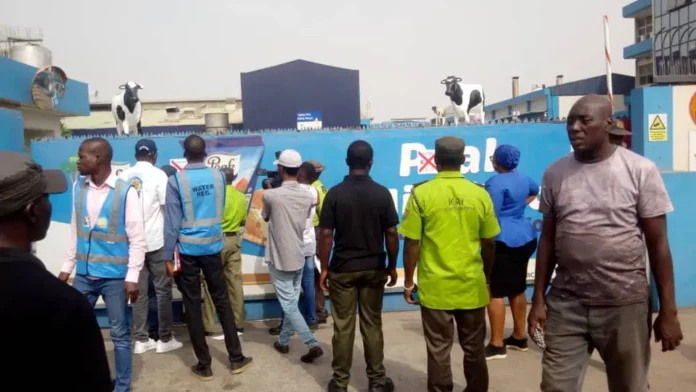The Lagos State Water Regulatory Commission (LASWARCO) has sealed the facilities of three of the largest beverage and dairy producers operating in the state: Nigerian Bottling Company (Coca-Cola), Guinness Nigeria, and FrieslandCampina (makers of Peak Milk). The action, which took place on Tuesday, December 24, 2024, marks a significant step in the state’s ongoing efforts to regulate water usage and protect the environment from further degradation.
The enforcement was carried out following a prolonged period of warnings and engagement with these companies, which LASWARCO officials said had failed to fully comply with the state’s regulations on groundwater extraction.
Lagos State has long faced challenges related to unregulated groundwater abstraction, which has had serious environmental consequences, including land subsidence and contamination of groundwater sources. The LASWARCO, empowered by the Environmental Management Protection Law of 2017, has the legal authority to regulate the extraction of groundwater and impose penalties on entities that violate these rules.
Speaking to reporters, Mr. Olowu Babatunde, Director of Technical Services at LASWARCO, outlined the agency’s mandate and its efforts to engage with companies engaged in heavy groundwater abstraction. “We operate a law that empowers us to regulate most of these heavy abstractors in Lagos State,” Babatunde explained. “These companies extract large quantities of groundwater for commercial purposes, and we’ve been monitoring their activities closely.”
Despite numerous attempts to address the issue through dialogue and compliance incentives, the companies involved have continued to operate outside the bounds of the law. Babatunde revealed that the engagement with the three companies—Coca-Cola, Guinness, and FrieslandCampina—has been ongoing for several years.
“For over seven years now, we’ve been engaging these companies. Some of them comply partially, while others have shown little to no willingness to comply,” Babatunde said. “Now that we have begun enforcing the regulation, we are forcing them to meet all the necessary requirements, and these actions are part of that effort.”
The sealing of the companies’ operations was a last resort after several attempts to encourage voluntary compliance. According to LASWARCO officials, letters were issued to the companies, giving them a 72-hour ultimatum to comply with the regulatory requirements.
The closure of the facilities comes after a stern warning from the Lagos State government regarding the risks posed by unregulated groundwater extraction. Mr. Tokunbo Wahab, Commissioner for the Environment and Water Resources, highlighted the potential dangers of continued illegal abstraction. “Unregulated extraction could lead to severe environmental consequences, including land subsidence, contamination of underground water sources, and other long-term ecological impacts,” Wahab cautioned.
In 2020, the Lagos State government introduced a 75% waiver on groundwater abstraction fees to encourage companies to come into compliance, but the response from the private sector, particularly the large companies involved, was disappointing. “We offered a substantial waiver to make compliance more attractive, but the response was poor,” Wahab noted.
The government had hoped that the financial incentive would prompt companies to follow the law and protect Lagos’ water resources, but with limited success. The recent enforcement action signals the government’s intent to take a hardline approach in safeguarding the state’s groundwater supplies.
Penalties and Future Outlook
As part of the enforcement, penalties have been imposed on the companies for continuing operations without the required authorization. LASWARCO is now calling for a more stringent monitoring system to prevent future violations.
Wahab emphasized that the enforcement was not just about penalizing the companies but about ensuring that Lagos’ water resources are protected for the benefit of the entire population. “The regulation of groundwater is critical to the future sustainability of Lagos’ environment and resources,” he said.
With the government now enforcing stricter regulations, industry watchers expect other companies engaged in large-scale groundwater abstraction to comply with the rules or face similar actions.
“We must ensure that everyone, including the largest corporate entities, follows the rules,” Wahab asserted. “This is not just about the companies; it is about ensuring the future of our state’s water resources.”
As of now, the Nigerian Bottling Company (Coca-Cola), Guinness, and FrieslandCampina are still under seal, with the companies facing a significant disruption to their operations as they work to resolve their compliance issues. If they fail to meet regulatory demands, the companies could face even steeper fines and further enforcement actions in the coming months.
The sealing of major companies has drawn mixed reactions from both the public and industry stakeholders. Environmental activists have praised the government’s decision, with many seeing it as a long-overdue move to hold powerful corporations accountable for their environmental practices. “This is a major win for the environment and for the people of Lagos. These companies must realize that they cannot continue to extract water without considering the consequences,” said one environmentalist, who requested anonymity.
On the other hand, some industry insiders have expressed concern about the long-term impact of the shutdowns. “While the regulatory framework is essential, it is important that the government works with businesses to ensure they are not unduly disrupted. These companies contribute significantly to the economy and provide jobs for many Lagosians,” an industry source commented.

